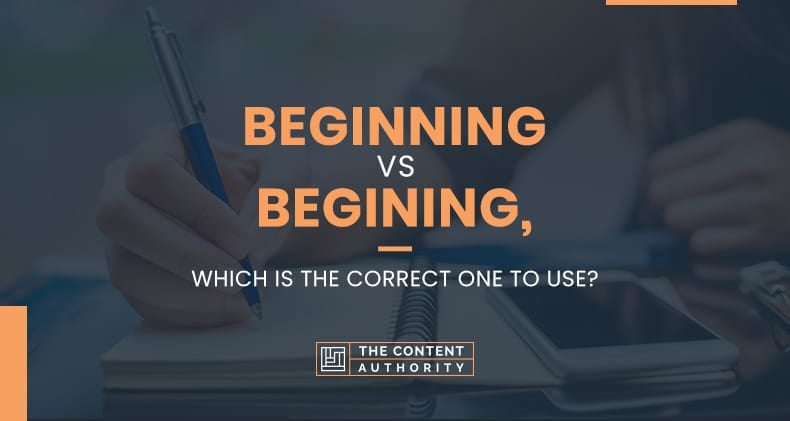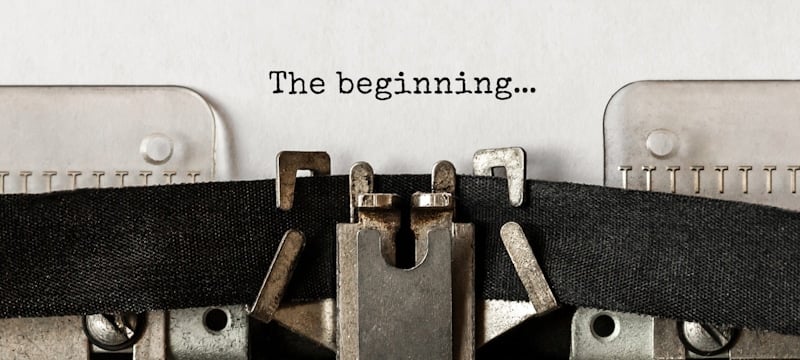Every now and then, we tend to use incorrect spellings without being conscious of it; such is the case of Beginning Vs. Begining, where it might seem right for some but wrong for others. Which is the correct one to use? Or when should they be used? This is a common confusion when it comes to writing, and one of the words commonly misused and misspelled for the other. Here is a clear answer as to which is the correct one to use.
The correct spelling is “beginning,” but it tends to be misspelled as “begining” based on the similarities in word patterns. We must remember that the proper term to use always has a double ‘n’ despite one of them being silent.
Some people, when in doubt, would decide to use a different word or a synonym to avoid the headache of figuring out a spelling. I remember my mother telling my sisters and me about her journey during school years, how she always had to carry around a dictionary, go to the library, and do extensive research to gather information and clarify any topic. Thanks to technology, we have the answers to most of our concerns within a matter of seconds. Just a click away, we find the results we are looking for and exciting details we weren’t aware we needed.
Definition
Beginning implies the early part of a venture, the start of something new, or the origin of something. It also refers to the act of doing something at an early stage in time, state, or space. Beginning is a word that’s constantly being used if you haven’t noticed. It is all over our history textbooks, newspapers, magazines, and social media.
Origin
Beginning comes from the verbal noun begin, which in old English was ‘beginnan’ meaning to attempt or undertake something. It’s a combination of the verb to be-+ west germanic *ginnan. From the late 12th century was known to define originate or be the originator of something, but in the early 13th century, it changed to refer to the first step in or something to start with. The word has not changed much since then, but the different usage and conjugations have. It’s a word that doesn’t change its meaning no matter the English country where it’s being spoken.
Different Misspelling For Beginning
The word gets misspelled often because of the repetitive patterns of the letter ‘n,’ and it is a frequent mistake that we see in terms that have double consonants. We know that grammar is a crucial point for written communication; therefore, knowing the grammatical rules would be helpful when it comes to spelling. Here are some of the most frequent misspellings of the word beginning:begining, beginnig, beggining, beginnin, begening, and a few others. Based on some statistics and research about this topic, it shows that begining is the recurrent misspelling, with a 37.9% in rank.
Word Type
Begin As A Verb
To originate, to proceed to perform the early stage of some action, or to start.
Sentences with beginning as a verb (Begin)
- When you look at it, you begin to realize; word puzzles can be very complicated if you’re not used to them.
- Some schools in the Dominican Republic decided to begin celebrating Halloween and Thanksgiving.
- I will begin my research paper tomorrow morning; today, I feel drained and have no energy.
- The story begins with an exciting plot, but the ending is very tragic.
- Julia will begin to divide the topics for the presentation later tonight, and I am helping her with the division.
- Mary is indecisive, and she does not know if she should begin a master’s in human resources or administration.
- If I begin to tell you the story of how I fell in love with your father, you wouldn’t believe we would last this long-married.
- Not to begin with my negative thoughts, but I don’t think we should go camping in cloudy weather tomorrow.
- Amy will begin writing a novel this summer and is looking forward to being a best-selling author.
- I begin training on Monday, and I won’t get paid until next Friday, so I can not go out partying tonight.
- James was about to begin reading his comic magazine, but Sophia wouldn’t stop crying.
- Mr. Roger said that you could begin your final exam on the count of three but don’t forget to write the date on top and your full name first.
- She said she would begin to forgive you when you demonstrate you love her and won’t do it again.
Beginning As A Noun
The circumstance or act of starting; the point where something begins; the first part; the initial stage of origin.
Sentences with beginning as a noun
- I moved to Alaska for an internship, but I was beginning to hate the cold weather and cloudy seasons all year long.
- Everything seems lovely at the beginning of a relationship, you are getting along with your partner, and everything is going well until the fighting and drama begin.
- My anxiety was beginning to sink in, and I was getting a panic attack in public.
- We arrived late to the movies and missed the beginning where the main characters were telling their stories.
- Ana Rodriguez was a patient in depression for months, but recently she was beginning to feel better.
- Hannah told Bethany to stop yelling at her; she was beginning to sound like her mother and not her friend.
- Marcus finally got divorced from Marlenny; I was beginning to wonder when he would do so.
- You’re beginning to act just like your alcoholic friends!
- There were only ten minutes left for the lecture to finish, but I couldn’t understand anything from the beginning.
- Mary, the editor, corrected my article and decided the beginning was not engaging and I should write it all over again.
- John left his country searching for a new beginning, somewhere where he could be free and be his true self.
- Beginning this winter, I will start dieting and having healthy habits to prepare for the Olympics.
- Are you studying for your math test? Timothy heard the beginning of the exam is the hardest part.
- I told you from the beginning that I would not tolerate lies, and now I can’t forgive you.
- The beginning of technology brought chaos and additions, separating families and friends from reality.
Synonyms And Antonyms
Synonyms For Beginning
These are some words that will mean the same if you refer to the beginning: start, commencement, origin, day-one, initiation, elementary, indication, genesis, provenience, first, foundation, cause, leading, early, introductory and more. All of these words can be a great substitution of beginning utilized in the proper context.
Antonyms For Beginning
Here are some words that mean the opposite of beginning: finish, ending, conclusion, the last part, the result, expiration, termination, the end, middle, completing, the outcome, subsiding, and few others. This is helpful to avoid any confusion when expressing ideas that have nothing to do with the starting of something.
Conclusion
Knowing what appropriate spelling to use, grammatical rules, conjugations, and tenses will allow us to communicate appropriately and give clear ideas of what we are trying to say or write. Understandably, we will not memorize all of these parts for the thousands of words in the dictionary. Luckily for us, the internet is a quick guide to respond if we are in a hurry and stuck while writing a high school or college essay. This article intends to be a clear guide of using the word beginning, and that “begining” is not the proper spelling to use.
Shawn Manaher is the founder and CEO of The Content Authority. He’s one part content manager, one part writing ninja organizer, and two parts leader of top content creators. You don’t even want to know what he calls pancakes.



